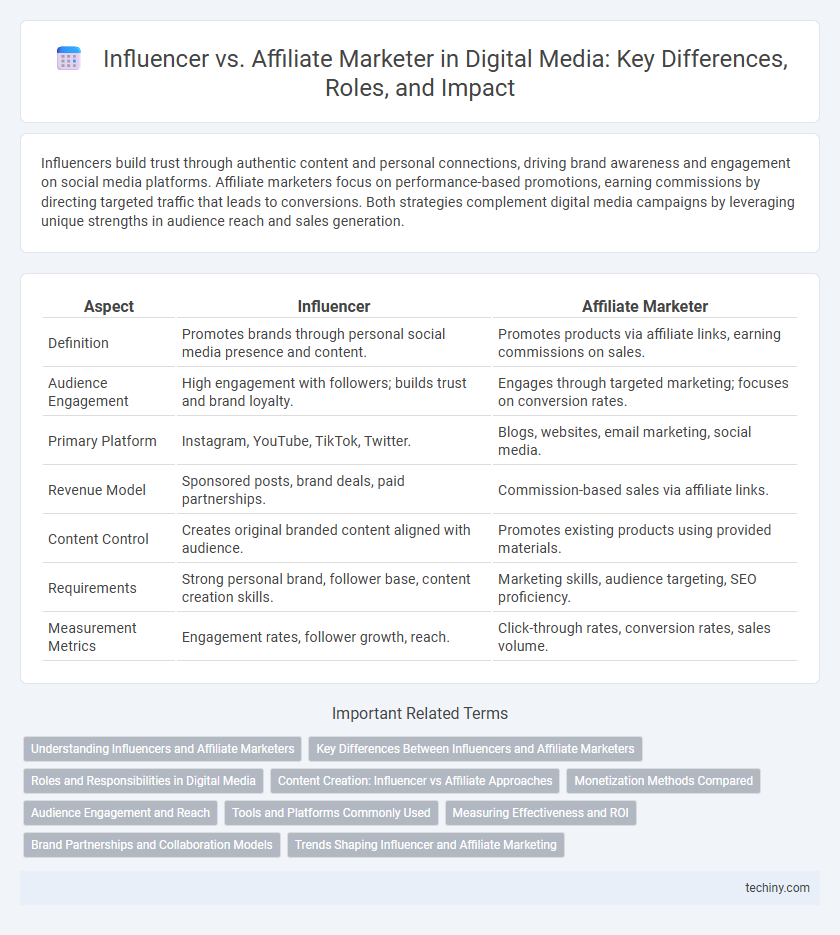Influencers build trust through authentic content and personal connections, driving brand awareness and engagement on social media platforms. Affiliate marketers focus on performance-based promotions, earning commissions by directing targeted traffic that leads to conversions. Both strategies complement digital media campaigns by leveraging unique strengths in audience reach and sales generation.
Table of Comparison
| Aspect | Influencer | Affiliate Marketer |
|---|---|---|
| Definition | Promotes brands through personal social media presence and content. | Promotes products via affiliate links, earning commissions on sales. |
| Audience Engagement | High engagement with followers; builds trust and brand loyalty. | Engages through targeted marketing; focuses on conversion rates. |
| Primary Platform | Instagram, YouTube, TikTok, Twitter. | Blogs, websites, email marketing, social media. |
| Revenue Model | Sponsored posts, brand deals, paid partnerships. | Commission-based sales via affiliate links. |
| Content Control | Creates original branded content aligned with audience. | Promotes existing products using provided materials. |
| Requirements | Strong personal brand, follower base, content creation skills. | Marketing skills, audience targeting, SEO proficiency. |
| Measurement Metrics | Engagement rates, follower growth, reach. | Click-through rates, conversion rates, sales volume. |
Understanding Influencers and Affiliate Marketers
Influencers leverage personal brand and social media presence to promote products authentically, engaging their followers through relatable content that builds trust and drives organic sales. Affiliate marketers use performance-based marketing strategies, earning commissions by directing traffic and sales through tracked affiliate links across various online platforms. Understanding the distinctions between influencers' relationship-driven promotion and affiliates' data-driven tactics is essential for optimizing digital marketing campaigns.
Key Differences Between Influencers and Affiliate Marketers
Influencers primarily build personal brands and engage audiences through authentic content across social media platforms, while affiliate marketers focus on promoting products through tracked links to earn commissions on sales. Influencers often receive direct sponsorships and maintain creative control over promotional content, whereas affiliate marketers rely on performance-based incentives without direct content creation obligations. The key distinction lies in influencers leveraging follower trust for brand partnerships, contrasted with affiliate marketers driving conversions through targeted promotions.
Roles and Responsibilities in Digital Media
Influencers cultivate personal brands by creating engaging content and building trust with their audience to promote products authentically. Affiliate marketers focus on driving sales through strategic placement of trackable links and performance-based promotions across various digital platforms. Both roles require strong digital marketing skills but differ in approach, with influencers leveraging personal influence and affiliates prioritizing measurable conversions.
Content Creation: Influencer vs Affiliate Approaches
Influencers prioritize authentic, engaging content that showcases personal experiences to build trust and loyalty with their audience. Affiliate marketers focus on persuasive, value-driven content designed to highlight product benefits and generate sales through tracked referral links. Both approaches leverage targeted content strategies, but influencers emphasize relationship-building while affiliates concentrate on conversion optimization.
Monetization Methods Compared
Influencers primarily monetize through sponsored content, brand partnerships, and product placements that leverage their personal audience engagement. Affiliate marketers earn commissions by promoting products or services via tracked links, earning a percentage of sales generated from their referrals. The key difference lies in influencers' reliance on brand deals tied to their persona, while affiliates focus on performance-based revenue through direct sales attribution.
Audience Engagement and Reach
Influencers cultivate strong audience engagement through authentic content and personal connections, often driving high interaction rates on social media platforms. Affiliate marketers typically leverage broader reach by promoting products across diverse channels, focusing on conversion-driven traffic rather than deep engagement. Effective digital media strategies balance influencer intimacy with affiliate scalability to maximize both reach and audience interaction.
Tools and Platforms Commonly Used
Influencers primarily utilize social media platforms like Instagram, TikTok, and YouTube alongside content creation tools such as Canva and Adobe Premiere to engage audiences and build personal brands. Affiliate marketers rely heavily on performance marketing platforms like ShareASale, CJ Affiliate, and Amazon Associates to track commissions and manage campaigns effectively. Both leverage analytics tools like Google Analytics and social media insights to optimize strategy performance and audience targeting.
Measuring Effectiveness and ROI
Measuring effectiveness in digital media involves tracking engagement metrics, conversion rates, and audience reach for both influencers and affiliate marketers. Influencers primarily boost brand awareness and trust, often measured through social media impressions, likes, and follower growth, while affiliate marketers focus on direct sales and revenue generation via unique affiliate links and commission tracking. ROI analysis depends on comparing the cost of influencer campaigns against sales uplift or affiliate payouts against attributed conversions, providing clear insights into performance efficiency.
Brand Partnerships and Collaboration Models
Influencer partnerships primarily focus on brand collaborations that leverage personal audience trust through authentic content creation and social media engagement, driving direct consumer interaction and brand visibility. Affiliate marketers operate within a performance-based collaboration model, using tracked links and commission structures to optimize conversion and sales metrics, often spanning multiple brands and products simultaneously. Both models are pivotal in digital media strategies but differ fundamentally in relationship dynamics and measurement of campaign success.
Trends Shaping Influencer and Affiliate Marketing
Influencer marketing continues to evolve with trends like authentic content creation and micro-influencers driving higher engagement rates, while affiliate marketing benefits from advancements in AI-powered tracking and personalized affiliate programs enhancing conversion efficiency. The rise of short-form video platforms such as TikTok and Instagram Reels has notably shifted both influencer and affiliate marketing strategies toward dynamic, bite-sized content that boosts audience interaction. Data analytics tools are increasingly critical in optimizing campaign performance by enabling real-time adjustments and targeted audience segmentation for both marketing approaches.
Influencer vs Affiliate Marketer Infographic

 techiny.com
techiny.com